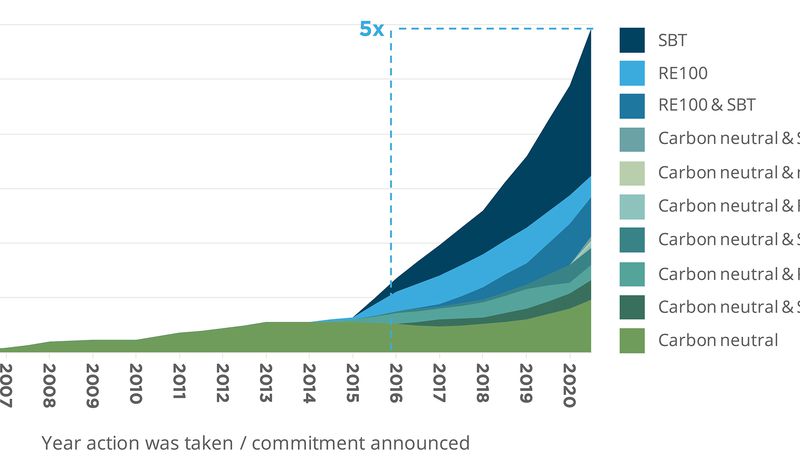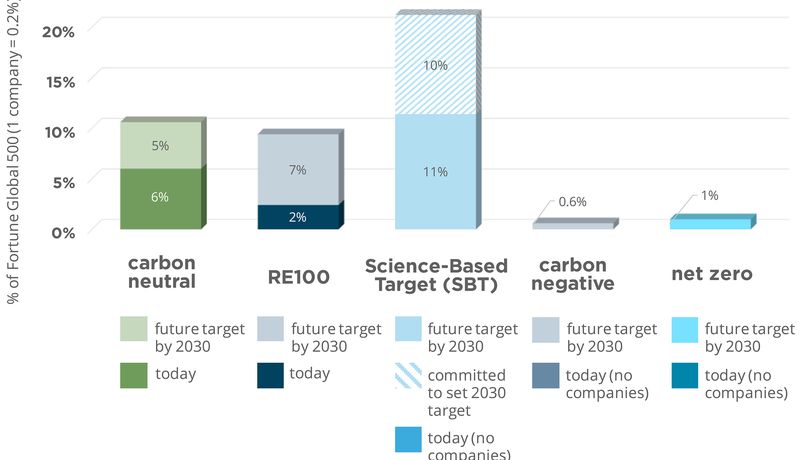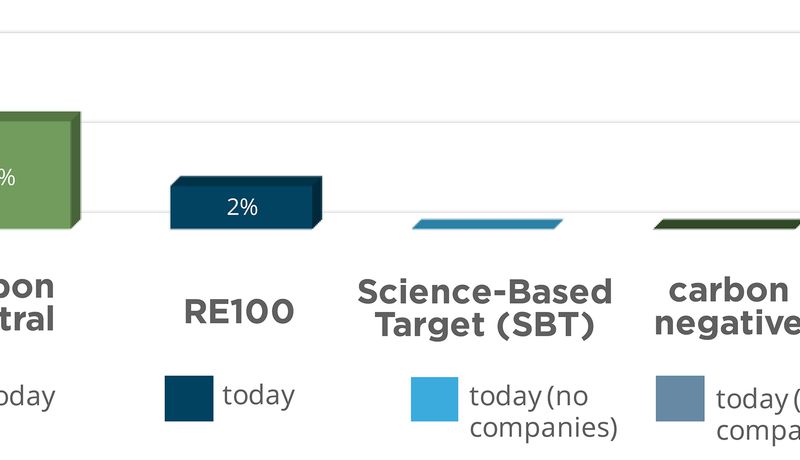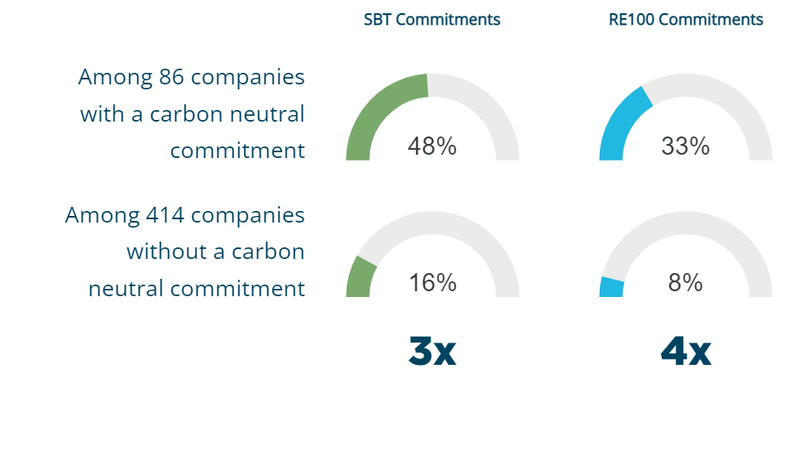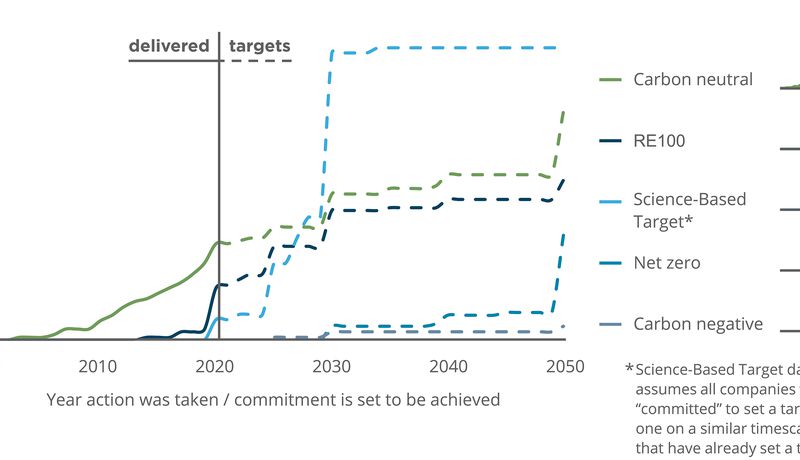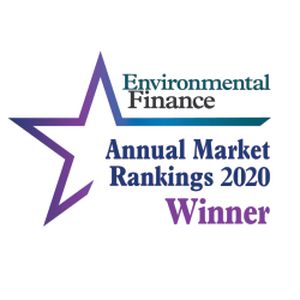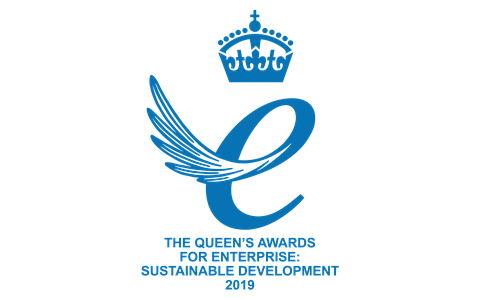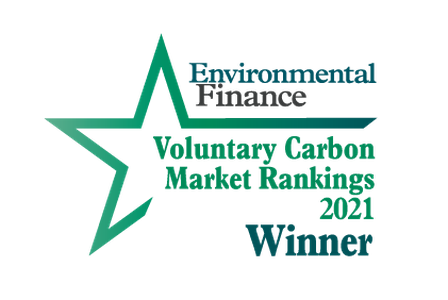How the Fortune Global 500 is delivering climate action and the urgent need for more of it.
Despite the unprecedented disruption across societies and economies around the world, the continued increase in climate action in the private sector appears to have strengthened.
Following last year’s report, we now see a continuation of the trend towards both near-term and long-term climate commitments.
Carbon neutrality, RE100 and SBTs continue to dominate the landscape of action and commitments between now and 2030. 30% of companies in the Fortune Global 500 have achieved one of these climate commitments or have publicly stated they will do so by 2030.
There are also some early moves towards net zero commitments, the majority of them targeting dates further into the future. Our analysis shows how all these programmes complement each other in the general move towards greater corporate climate action: for example companies with a carbon neutral commitment are three times more likely to have an SBT.
A report published by the UN in 2019 analysed government commitments to emission reductions and found that with current commitments, by 2030 emissions will be twice what they need to be in order to keep global temperature rise to 1.5 degrees Celsius.
Business has a key role to play in closing that gap and this is the decade in which results need to be delivered. Our research shows who is stepping up. And for those who aren’t? We hope there are lessons to be learnt from the 149 of the Fortune Global 500 already on the journey and reaping the benefits.
We looked at the Fortune Global 500, which have combined revenues of $33 trillion and employ 70 million people around the world.
We chose this list of companies not only because of the climate impact of their own operations, but also because of their significant influence on their suppliers, customers and the wider world of business and government.
We studied the action and commitments that companies have made towards:
- Carbon neutrality
- RE100 targets for 100% renewable power
- Science Based Targets (SBT) for emission reductions
This year we have brought an additional focus in three areas:
- Net zero
- Carbon negative
- Advocacy, taken from InfluenceMap Score
We looked at whether companies are already meeting those commitments or are publicly committed to achieve them by 2030: the IPCC’s key deadline for getting on the path that limits the global average temperature rise to 1.5 degrees Celsuis.
30% of companies in the Fortune Global 500 have delivered a significant climate milestone or are publicly committed to do so by 2030.
This is up a third on last year (up seven percentage points from 23% in the 2019 report) and five times greater than when the Paris Agreement was agreed in December 2015. Many are set to achieve multiple goals by 2030.
Increases in commitments to RE100 and SBTs are particularly high over the last five years since those initiatives only began in 2014 and 2015 respectively.
We see companies taking these actions to prepare for a carbon-constrained world and the likelihood of increased regulation, to meet growing demand from shareholders, customers and employees, to reduce risk in their supply chains, and to improve the efficiency of their operations.
Looking at the different achievements and targets individually, we can see that carbon neutrality, RE100 and SBTs continue to dominate the landscape of action and commitments between now and 2030.
Carbon neutrality (54), RE100 (47), SBTs (57 “Target Set” and a further 49 are “Committed” to set a target), dominate action today and commitments between now and 2030. A small number of companies have net zero (5) and carbon negative (3) targets by 2030.
Through carbon neutral programmes companies immediately achieve a target, showcase their commitment to climate action, use it to drive greater internal efficiencies, and contribute finance to the low carbon transformation of the economy.
SBTs provide pathways for companies to deliver emission reductions across their operations and value chains. 100% renewable power targets, across all companies in the RE100 initiative, equate to more than half of California’s electricity demand.
Carbon neutrality dominates the climate milestones achieved to date: outnumbering RE100 3:1.
The majority of Science-Based Targets are medium term – of the 57 companies that have set a target, 51 have set it to be achieved between 2025 and 2034. Similarly, net zero or carbon positive/negative goals are all future focused.
Carbon neutrality provides a framework for companies to make an immediate climate impact, reducing and offsetting their emissions now while deeper operational changes are made. 6% (30) of Fortune Global 500 companies are carbon neutral today.
For Global Fortune 500 companies headquartered in Europe and North America the proportion that are carbon neutral today is higher: 8%. For many companies, carbon neutrality is the first step in an evolving transition to a low carbon economy.
2% (12) of companies are using 100% renewable power today, and with increasing price parity with fossil fuels it is both achievable and economically viable.
SBTs provide a pathway to make internal emissions abatement, seeking out efficiencies across operations and replacements for carbon-intensive processes.
Companies are assumed to be on track towards delivering their approved SBT: SBTi states that if it becomes apparent through annual emissions inventories that a company is not delivering on its targets, the SBTi will remove the company from its list.
The SBTi does not currently specifically track companies’ progress against delivery of their targets.
The research found that commitments to carbon neutrality frequently complement SBTs and RE100 targets.
Companies with a carbon neutral commitment are three times more likely to have an SBT and four times more likely to be an RE100 signatory than companies without a carbon neutral commitment.
Becoming carbon neutral enables companies to showcase their commitment as part of a broader set of climate actions.
Often carbon neutrality is the first step in an evolving journey or offers a capstone to a range of other climate initiatives. By financing emissions reductions and removals as part of the low carbon transformation of the economy, carbon neutrality puts a price of carbon into the business to incentivise internal reductions.
By taking a longer view and looking at all targets out to 2050, net zero commitments come into the picture.
6% (32) of companies have a net zero target set between 2031 and 2050, whereas only 1% (5) have set a net zero target to be achieved earlier – all by 2030.
Definitions of net zero are still currently quite varied.
Net zero initiatives mentioned by Fortune Global 500 companies included: the Science Based Targets Initiative, Transform to Net Zero from Microsoft, Unilever and others and The Climate Pledge from Amazon and Mercedes-Benz.
50% of companies with a net zero target have an SBT and 66% of companies with a net zero target include all Scope 3 emissions in the target.
We found that carbon neutrality action and commitments give companies the platform to advocate for stronger climate policies.
Companies are 13 times more likely to lobby for strong climate policy if they are carbon neutral or have a carbon neutrality target. The current availability of data and analysis on climate advocacy means that this finding was from a relatively small dataset.
The framework laid out seven “imprints” that companies can use to contribute to a net zero economy.
The first three center around carbon neutrality across a business’s operations, suppliers and products. The final four build on that platform of action to extend a company’s influence and impact through new business models and advocacy to speed the wider transformation and regeneration of the global economy.
Our research found that 9% (8) of companies that are carbon neutral, or have a public commitment to be carbon neutral, were on InfluenceMap’s list of companies that are lobbying for stronger climate policies. This compares to 1% (1 company) that was on the list and didn’t have a carbon neutral achievement or target.
As a result, it appears that companies are 13 times more likely to lobby for strong climate policy if they are carbon neutral or have a carbon neutrality target. Although this finding was from a relatively small dataset, with InfluenceMap only quantifying the impact on the global climate policy agenda of 33 companies in the Fortune Global 500.
Summary
We believe that the power of business can, and should, be harnessed to build a more sustainable world.
While emissions continue to rise, and government commitments continue to fall short, the role of business is more important than ever.
We are in the decade of climate action and we’re proud to work with Fortune Global 500 companies like HP, ING Group, MetLife, Microsoft and UPS to help them take climate action today. What will it take for the rest to step up?
Contact us to find out how we can help you deliver your climate change goals and download the full data appendix below.
30% of companies in the Fortune Global 500 have achieved one of these climate commitments or have publicly stated they will do so by 2030. This is up 7% from last year.


